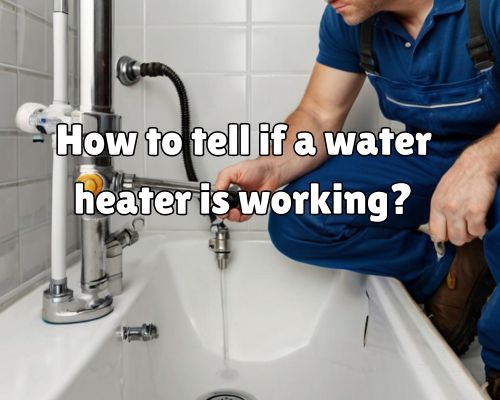
How to Tell if a Water Heater Is Working:
Essential Tips and Signs
Knowing whether your water heater is functioning correctly can save you time, money, and avoid potential headaches.
If you notice water pooling around the base of your water heater or a lack of hot water, these can be key indicators that something is amiss.
Regular checks and a basic understanding of how your water heater operates are essential for every homeowner.” said Dean Owens of Plumber Warragul

One simple way to test your water heater’s functionality is to inspect for leaks around valves and pipes.
If tightening any loose connections doesn’t solve the problem, you might need to test the heating elements using a multimeter, a common tool for checking electrical currents.
Other signs of a malfunctioning water heater include inconsistent water temperatures and unusual noises coming from the unit.
Keeping an eye on these potential issues will ensure that your home has a steady supply of hot water.
By identifying problems early, you can maintain the efficiency of your water heater and extend its lifespan.
Assessing Water Heater Functionality
To evaluate if your water heater is functioning properly, it is crucial to conduct detailed visual inspections and address common issues.
Key aspects to examine include the thermostat, heating elements, power supply, and potential leaks.
Visual Inspections and Basic Checks
Begin by visually inspecting your water heater for any obvious signs of malfunction.
Electric water heaters and gas water heaters alike can suffer from issues such as leaks and corrosion.
Check for water pooling around the unit, which could indicate a leaking water heater or a faulty valve.
Inspect the pressure relief valve and the drain valve for any signs of wear or damage.
Ensure that the pilot light is lit on gas water heaters.
On electric models, examine the reset button and make sure it has not been triggered.
For tankless water heaters, confirm that all settings are properly adjusted and that the unit is free from obstruction.
Troubleshooting Common Issues
If your water heater provides no hot water, the issue might lie with the power supply or the heating elements.
In electric models, use a multimeter to check the resistance of the heating elements and the thermostats. Replace any faulty components.
For gas units, check the pilot light and gas supply.
Lukewarm water or inconsistent temperatures may suggest a faulty heating element or sediment build-up in the tank.
Drain the tank to remove sediments and adjust the thermostat settings if necessary.
Strange noises can be indicative of sediment build-up or worn-out parts.
Regular maintenance, such as flushing the tank annually, can prevent these issues.
If the problem persists, especially for serious leaks or lack of hot water, it is advisable to call a professional like Plumber Warragul, to examine and repair the unit.
Professional Assessment and Maintenance
Regular professional assessments and proper maintenance are essential for ensuring your water heater’s efficiency and longevity.
Proper care can help you avoid many common issues, such as sediment buildup, rust, and malfunctioning components.
When to Call a Professional Plumber
Certain signs indicate that it may be time to call a professional plumber for your water heater.
If you notice rust or a foul odour in the water, you may have a corroded anode rod or tank damage. Such issues require immediate professional attention to prevent further damage.
A reduction in your hot water supply suggests potential sediment buildup in the tank or a faulty heating element.
If troubleshooting steps, like adjusting the thermostat, do not resolve the problem, a professional plumber can identify and fix the underlying water heater problem.
Leaking around the plumbing connections or access panel could indicate compromised seals or a fractured dip tube.
It’s crucial to get this checked out to prevent water damage and ensure reliable water heater operations.
Long-Term Care and Preventative Measures
To extend the lifespan of your water heater, consider long-term care strategies and preventative measures.
Routine inspections and maintenance by professionals every 6 to 12 months can be invaluable. This is particularly important for identifying hidden problems early.
Professionals often suggest flushing the tank regularly to remove mineral deposits and sediment buildup. This process keeps the heater efficient and reduces the chances of damage.
Replacing the anode rod periodically helps in preventing rust and corrosion inside the tank.
Regularly adjust the thermostat to optimal heat settings to save energy and prevent overheating.
Ensuring that all plumbing connections are tight and free from leaks also helps in maintaining the efficiency of your unit.
Checking under warranty terms may allow some replacements at minimal cost if the parts show early signs of malfunction.